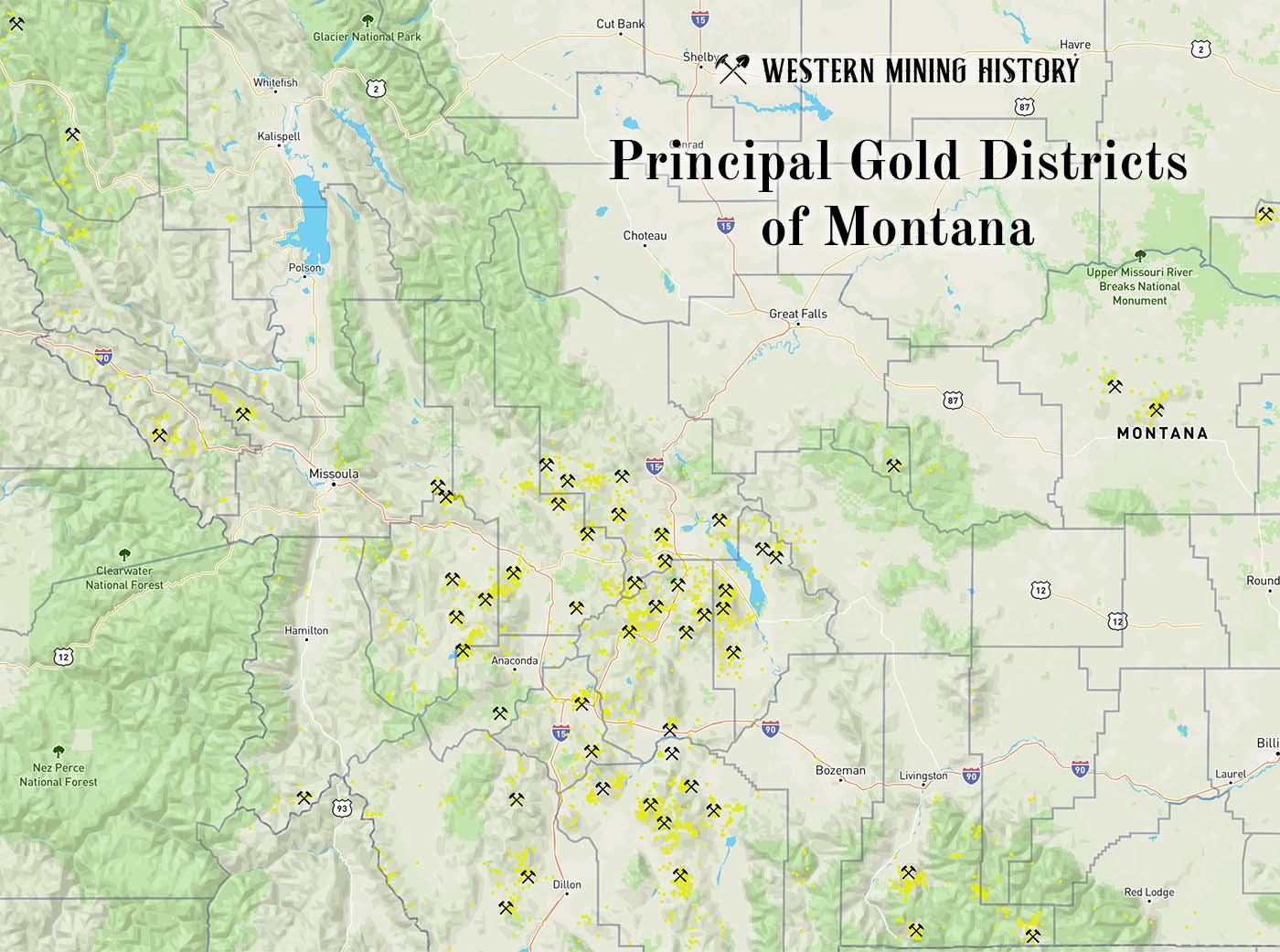The Emery Mine is a gold, silver, lead, and zinc mine located in Powell county, Montana at an elevation of 6,319 feet.
About the MRDS Data:
All mine locations were obtained from the USGS Mineral Resources Data System. The locations and other information in this database have not been verified for accuracy. It should be assumed that all mines are on private property.
Mine Info
Elevation: 6,319 Feet (1,926 Meters)
Commodity: Gold, Silver, Lead, Zinc
Lat, Long: 46.37722, -112.57917
Map: View on Google Maps
Emery Mine MRDS details
Site Name
Primary: Emery Mine
Secondary: Carbonate Hill Mine
Secondary: Carbonate Extension
Commodity
Primary: Gold
Primary: Silver
Primary: Lead
Primary: Zinc
Secondary: Copper
Tertiary: Antimony
Tertiary: Arsenic
Location
State: Montana
County: Powell
District: Emery (Zosell) District
Land Status
Land ownership: National Forest
Note: the land ownership field only identifies whether the area the mine is in is generally on public lands like Forest Service or BLM land, or if it is in an area that is generally private property. It does not definitively identify property status, nor does it indicate claim status or whether an area is open to prospecting. Always respect private property.
Holdings
Not available
Workings
Type: Underground
Ownership
Owner Name: Emery Consolidated Mining Corp.
Production
Year: 1966
Time Period: 1891-1966
Mined: 53550.000 mt
Material type: ore
Deposit
Record Type: Site
Operation Category: Past Producer
Deposit Type: Polymetallic veins
Operation Type: Unknown
Discovery Year: 1888
Discovery Method: Ore-Mineral In Place
Years of Production:
Organization:
Significant: Y
Deposit Size: S
Physiography
General Physiographic Area: Rocky Mountain System
Physiographic Province: Northern Rocky Mountains
Mineral Deposit Model
Model Name: Polymetallic veins
Orebody
Form: TABULAR
Structure
Type: R
Description: Boulder Batholith
Type: L
Description: West-Plunging Syncline, Northeast Northwest-Trending Fracture System
Alterations
Alteration Type: L
Alteration Text: Argillization, Oxidation, Silicification, Pyritization
Rocks
Name: Tuff
Role: Associated
Age Type: Host Rock
Age Young: Late Cretaceous
Name: Tuff
Role: Associated
Age Type: Associated Rock Unit
Age Young: Late Cretaceous
Name: Tuff
Role: Associated
Age Type: Associated Rock
Age Young: Late Cretaceous
Analytical Data
Analytical Data: ASSAY 1923 (FROM GLEANINGS OF FORMER ORE) .28-.78 OZ/TON AU, 15-38 OZ/TON AG, 3-12% PB, 5-13% ZN, 7-10% AS
Analytical Data: ASSAY $32-35/TON
Materials
Ore: Boulangerite
Ore: Sphalerite
Ore: Gold
Ore: Galena
Ore: Chalcopyrite
Ore: Tetrahedrite
Gangue: Ankerite
Gangue: Pyrite
Gangue: Quartz
Comments
Comment (Geology): LOW ANGLE REVERSE FAULTS
Comment (Reserve-Resource): THE INTERSECTION OF THE SWAN-SABBATH DAY VEIN WITH THE BLUE EYED MAGGIE OR EMERY VEIN MIGHT BE INVESTIGATED.
Comment (Location): UTM LOCATION OF EMERY SHAFT ; INFO FROM LAND.ST :(1959
Comment (Commodity): VEIN UNIFORM
Comment (Production): 1949 PRODUCTION FROM CARBONATE EXTENSION.
Comment (Development): ECON.COM: VEIN RANGES FROM 0.15 TO 2 FT. IN WIDTH; AVERAGE WIDTH ABOUT 0.6 FT.
Comment (Deposit): VEIN WIDENS AS IT FLATTENS. IT HAS MANY SMALL RUDELYPARRALEL FRACTURES THAT HAS BEEN FILLED WITH ORE MINERALS.
Comment (Workings): MINE DEVELOPED BY A 450 FT. TWO COMPARTMENT VERTICAL SHAFT, TWO INCLINED SHAFTS, AND AT LEAST 10 LEVELS FOR A DISTANCE OF ABOUT 1400 FT DOWNDIP
References
Reference (Deposit): MBMG BULL 98, P. 22, 23, 58.
Reference (Deposit): MBMG MEM 34, P. 29.
Reference (Deposit): USGS BULL 842, P. 274-77. P. 73-4
Reference (Deposit): USGS PP 57, P. 110-11.
Reference (Production): MBMG BULL 98, P. 58 , 60.
Principal Gold Districts of Montana

In Montana, 54 mining districts have each have produced more than 10,000 ounces of gold. The largest producers are Butte, Helena, Marysville, and Virginia City, each having produced more than one million ounces. Twenty seven other districts are each credited with between 100,000 and one million ounces of gold production. Read more: Principal Gold Districts of Montana.